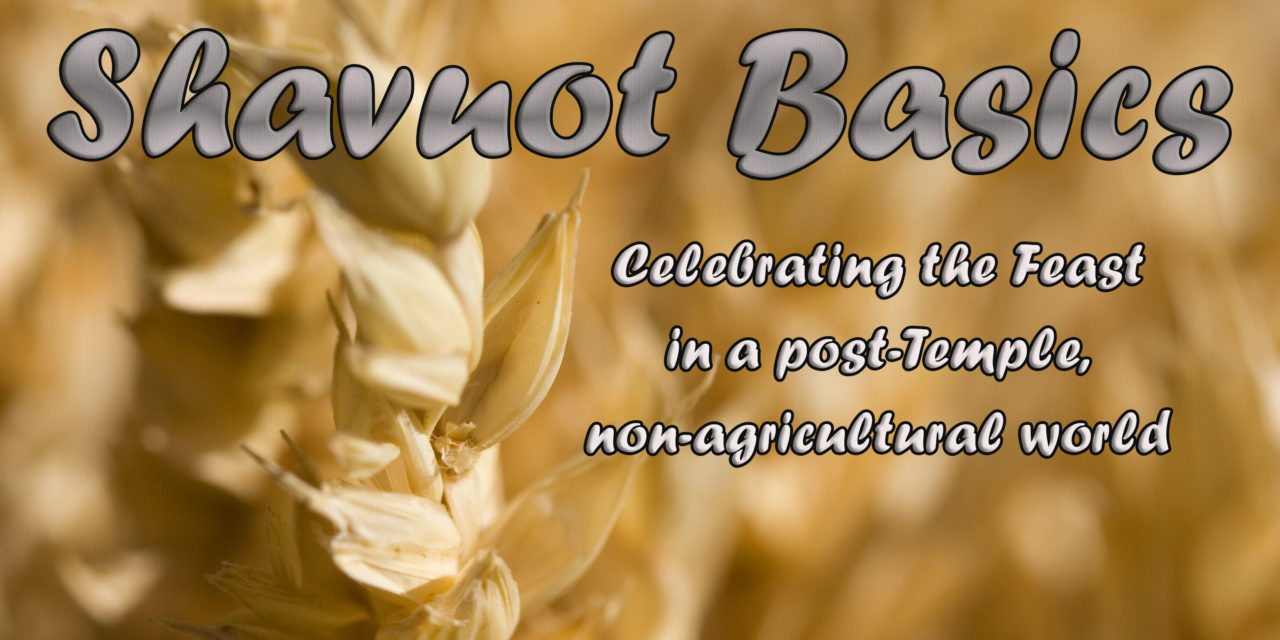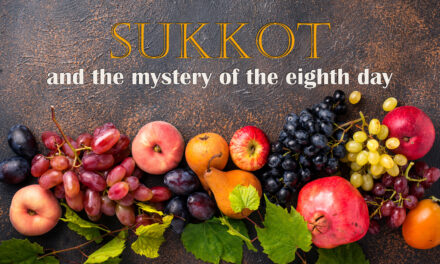Well, we have come to the time of year that I get the most “how to” questions and have the least amount of answers–Shavuot.
Don’t get me wrong, Shavuot is an amazing Feast–one where we saw the Holy Spirit/Ruach HaKodesh come down in power on the gathered believers in the “House” aka the Temple (which was/is referred to as Beit HaMikdash, translated House of Holiness or Sanctified House) in front of the festivalgoers from around the “world”–aka the Greco-Roman and Parthinian diaspora Jewish communities as well as Gentile godfearers. We have reason to celebrate. but we cannot celebrate as was commanded during Temple times. And by the way, I am using the NIV for this as this shows the translation of Shavuot, “weeks”, for the seven weeks of the counting of the omer, which can be helpful in understanding.
Lev 23:15 “‘From the day after the Sabbath, the day you brought the sheaf of the wave offering, count off seven full weeks. 16 Count off fifty days up to the day after the seventh Sabbath, and then present an offering of new grain to the Lord. 17 From wherever you live, bring two loaves made of two-tenths of an ephah of the finest flour, baked with yeast, as a wave offering of firstfruits to the Lord. 18 Present with this bread seven male lambs, each a year old and without defect, one young bull and two rams. They will be a burnt offering to the Lord, together with their grain offerings and drink offerings—a food offering, an aroma pleasing to the Lord. 19 Then sacrifice one male goat for a sin offering and two lambs, each a year old, for a fellowship offering. 20 The priest is to wave the two lambs before the Lord as a wave offering, together with the bread of the firstfruits. They are a sacred offering to the Lord for the priest. 21 On that same day you are to proclaim a sacred assembly and do no regular work. This is to be a lasting ordinance for the generations to come, wherever you live.
Num 28:26 “‘On the day of firstfruits, when you present to the Lord an offering of new grain during the Festival of Weeks, hold a sacred assembly and do no regular work. 27 Present a burnt offering of two young bulls, one ram and seven male lambs a year old as an aroma pleasing to the Lord.28 With each bull there is to be a grain offering of three-tenths of an ephah of the finest flour mixed with oil; with the ram, two-tenths; 29 and with each of the seven lambs, one-tenth. 30 Include one male goat to make atonement for you. 31 Offer these together with their drink offerings, in addition to the regular burnt offering and its grain offering. Be sure the animals are without defect.
Deut 16:9 Count off seven weeks from the time you begin to put the sickle to the standing grain. 10 Then celebrate the Festival of Weeks to the Lord your God by giving a freewill offering in proportion to the blessings the Lord your God has given you. 11 And rejoice before the Lord your God at the place he will choose as a dwelling for his Name—you, your sons and daughters, your male and female servants, the Levites in your towns, and the foreigners, the fatherless and the widows living among you.12 Remember that you were slaves in Egypt, and follow carefully these decrees.
Every one of God’s Feasts is a celebration of God’s deliverance and bounty, and of course each Feast is also a picture of the Messiah. However, most of the Feasts have at least something about them that can be performed/practiced (as we cannot keep the Feasts anymore without a Temple) without the Temple–except this one. We cannot offer the special sh’tei halechem offering, or the animals, nor can we parade up to the priests with baskets full of the firstfruit bounty of the Land:
Deut 26: When you have entered the land the Lord your God is giving you as an inheritance and have taken possession of it and settled in it, 2 take some of the firstfruits of all that you produce from the soil of the land the Lord your God is giving you and put them in a basket. Then go to the place the Lord your God will choose as a dwelling for his Name 3 and say to the priest in office at the time, “I declare today to the Lord your God that I have come to the land the Lord swore to our ancestors to give us.” 4 The priest shall take the basket from your hands and set it down in front of the altar of the Lord your God. 5 Then you shall declare before the Lord your God: “My father was a wandering Aramean, and he went down into Egypt with a few people and lived there and became a great nation, powerful and numerous. 6 But the Egyptians mistreated us and made us suffer, subjecting us to harsh labor. 7 Then we cried out to the Lord, the God of our ancestors, and the Lord heard our voice and saw our misery, toil and oppression. 8 So the Lord brought us out of Egypt with a mighty hand and an outstretched arm, with great terror and with signs and wonders. 9 He brought us to this place and gave us this land, a land flowing with milk and honey; 10 and now I bring the firstfruits of the soil that you, Lord, have given me.” Place the basket before the Lord your God and bow down before him. 11 Then you and the Levites and the foreigners residing among you shall rejoice in all the good things the Lord your God has given to you and your household.
This parade was quite the event, famously participated in by King Agrippa, the grandson (or great-grandson, as it is not specified) of Herod the Great who was the most respected of the bunch and the only Herod who ever truly took his religion seriously. Each man would raise a basket, made of common materials or even silver and gold, onto his shoulder and present it personally to the priests:
“The flute played before them until they reached the Temple Mount. When they reached the Temple Mount even King Agrippa would take the basket on his shoulder and enter, until he reached the Temple court. When he reached the Temple Court the Levites intoned the song, “I will extol you, O Lord, for You have raised me up, and have not allowed my enemies to rejoice over me.” (Ps. 30.2) (from the Kehati Commentary on Mishnah Tractate Bikkurim 3.4)
Of course, none of this is possible now, nor has it been possible for the last 1951 years, and so in the post 70 AD world, the Jews knew that they needed to tweak the festival just a bit in order to keep it alive. Because of the timing of Shavuot, it has always lined up really well with the giving of the Torah at Mt Sinai, and so this Feast was repurposed into a celebration of what remained–the Torah! It was a brilliant and needed bit of re-engineering to keep the Festival from fading into memory and dying out.
So, how is Shavuot celebrated? First of all, it is customary to honor the harvest roots of this Feast through the reading of the book of Ruth–that isn’t hard to understand. Ruth is all about that season between the beginning of the barley harvest and the end of the wheat harvest, and is a beautiful picture of the Kinsman-Redeemer, Boaz, who is a picture of the Messiah grafting the Gentiles who come to believe in and follow the God of Abraham, Isaac and Jacob into His people Israel.
Second, this is a holiday where people traditionally celebrate through the eating of dairy products and especially sweet dairy products. As God promised to deliver His people into the Land of milk and honey, this makes perfect sense and you never have to twist my arm in order to convince me to have a piece of cheesecake.
Third, this is the time when observant Jews spend all night studying the Torah, the first five books of Moses, as a reflection that it was in the month of Sivan (celebrated every Sivan 6 by modern Jews, except the Karaites, for whom the date fluctuates) when the commandments were first spoken to the gathered children of Israel and the mixed multitude gathered around the base of Mt Sinai.
Fourth, if you have a chance to spend this day in a synagogue, the liturgical ceremony is very beautiful. I did it one year and it is a very intensive day of worship and Scripture reading.
Fifth, this is the day–celebrated 50 days after what Christians term “Resurrection Sunday” or “Easter” (in the few Germanic languages) or most commonly, a derivative of Pasca in the rest of the world, known as Firstfruits in the Bible (read about it here) we celebrate the giving of the Holy Spirit to the Jewish believers in Yeshua/Jesus fifty days after His resurrection.
All this is to say that we have traditions, but nothing legislated in the Scripture that can currently be celebrated. In light of this, how sad would it be if we did nothing except take the day off of work and refused to do any more than is written? We are commanded to honor this day, which was set apart for honoring God for His deliverance out of slavery and into bounty. It was true around Mt Sinai and it is true today for those of us who live in the shadow of the Cross and who are the partakers of the greater (worldwide offering of) exodus from the powers of sin and death–which make Pharaoh look like an amateur because he could only manage to keep one nation enslaved while sin and death were hounding and oppressing us all.
So, on Shavuot, celebrate that deliverance! Pass the cheesecake with extra thick graham cracker crust for me, please!





















